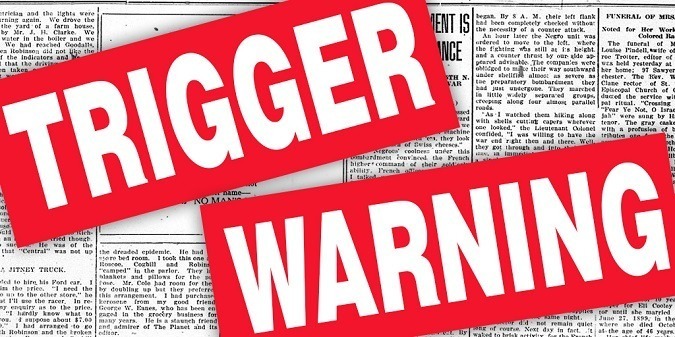Study: Trigger warnings don’t work, may undermine emotional resilience

___
It’s Official—Trigger Warnings Might Actually Be Harmful (Medium):
“In the era of college student sensitivities to a seemingly ever-increasing list of possible offending material, the use of so-called “trigger warnings” has become commonplace on university campuses. These warnings are usually given at the beginning of a class (or at the beginning of specific sections of a class) to prepare students…”
After controlling for various factors, such as sex, race, age, psychiatric history, and political orientation, the researchers found that those participants who received trigger warnings were significantly more likely (compared to those in the control condition) to suggest that they and others would be more vulnerable to emotional distress after experiencing trauma.
Although there was no significant effect of which condition participants were in on their general anxiety level change (in response to mildly distressing texts), or their immediate anxiety responses to markedly distressing texts, those who believed that words can cause harm demonstrated a significantly higher level of immediate anxiety to markedly distressing passages (compared to those not holding this belief) in the trigger warning condition, but not in the control…The data in this study were clear–trigger warnings increase anticipated vulnerability to experience post-traumatic distress, and when paired with the belief that words can cause harm, such warnings can actively increase immediate experiences of anxiety.”
The Study:
Trigger warning: Empirical evidence ahead (Journal of Behavior Therapy and Experimental Psychiatry). From the abstract:
- Background and objectives: Trigger warnings notify people of the distress that written, audiovisual, or other material may evoke, and were initially used to provide for the needs of those with posttraumatic stress disorder (PTSD). Since their inception, trigger warnings have become more widely applied throughout contemporary culture, sparking intense controversy in academia and beyond. Some argue that they empower vulnerable individuals by allowing them to psychologically prepare for or avoid disturbing content, whereas others argue that such warnings undermine resilience to stress and increase vulnerability to psychopathology while constraining academic freedom. The objective of our experiment was to investigate the psychological effects of issuing trigger warnings.
- Methods: We randomly assigned online participants to receive (n=133) or not receive (n=137) trigger warnings prior to reading literary passages that varied in potentially disturbing content.
- Results: Participants in the trigger warning group believed themselves and people in general to be more emotionally vulnerable if they were to experience trauma. Participants receiving warnings reported greater anxiety in response to reading potentially distressing passages, but only if they believed that words can cause harm. Warnings did not affect participants’ implicit self-identification as vulnerable, or subsequent anxiety response to less distressing content.
- Limitations: The sample included only non-traumatized participants; the observed effects may differ for a traumatized population.
- Conclusions: Trigger warnings may inadvertently undermine some aspects of emotional resilience. Further research is needed on the generalizability of our findings, especially to collegiate populations and to those with trauma histories.


